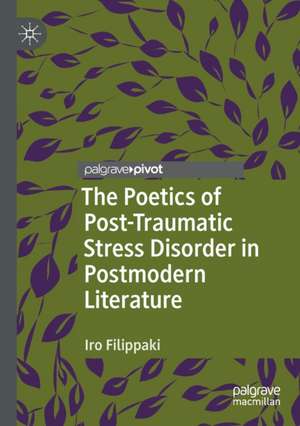The Poetics of Post-Traumatic Stress Disorder in Postmodern Literature: Palgrave Studies in Literature, Science and Medicine
Autor Iro Filippakien Limba Engleză Paperback – 16 apr 2022
| Toate formatele și edițiile | Preț | Express |
|---|---|---|
| Paperback (1) | 410.17 lei 6-8 săpt. | |
| Springer International Publishing – 16 apr 2022 | 410.17 lei 6-8 săpt. | |
| Hardback (1) | 416.34 lei 6-8 săpt. | |
| Springer International Publishing – 16 apr 2021 | 416.34 lei 6-8 săpt. |
Din seria Palgrave Studies in Literature, Science and Medicine
- 20%
 Preț: 628.35 lei
Preț: 628.35 lei - 15%
 Preț: 699.12 lei
Preț: 699.12 lei - 15%
 Preț: 521.26 lei
Preț: 521.26 lei - 18%
 Preț: 780.68 lei
Preț: 780.68 lei - 15%
 Preț: 700.10 lei
Preț: 700.10 lei - 15%
 Preț: 642.68 lei
Preț: 642.68 lei - 15%
 Preț: 588.37 lei
Preț: 588.37 lei - 15%
 Preț: 643.84 lei
Preț: 643.84 lei - 15%
 Preț: 698.80 lei
Preț: 698.80 lei - 15%
 Preț: 523.54 lei
Preț: 523.54 lei - 15%
 Preț: 499.12 lei
Preț: 499.12 lei - 15%
 Preț: 583.93 lei
Preț: 583.93 lei -
 Preț: 417.14 lei
Preț: 417.14 lei - 15%
 Preț: 691.91 lei
Preț: 691.91 lei - 15%
 Preț: 586.55 lei
Preț: 586.55 lei -
 Preț: 219.74 lei
Preț: 219.74 lei -
 Preț: 388.52 lei
Preț: 388.52 lei -
 Preț: 221.28 lei
Preț: 221.28 lei - 18%
 Preț: 783.98 lei
Preț: 783.98 lei -
 Preț: 389.11 lei
Preț: 389.11 lei - 18%
 Preț: 783.50 lei
Preț: 783.50 lei - 15%
 Preț: 527.15 lei
Preț: 527.15 lei - 15%
 Preț: 586.23 lei
Preț: 586.23 lei -
 Preț: 454.74 lei
Preț: 454.74 lei - 15%
 Preț: 582.95 lei
Preț: 582.95 lei - 15%
 Preț: 527.48 lei
Preț: 527.48 lei -
 Preț: 385.84 lei
Preț: 385.84 lei -
 Preț: 383.71 lei
Preț: 383.71 lei -
 Preț: 382.57 lei
Preț: 382.57 lei - 15%
 Preț: 501.55 lei
Preț: 501.55 lei - 15%
 Preț: 642.03 lei
Preț: 642.03 lei - 18%
 Preț: 737.43 lei
Preț: 737.43 lei - 18%
 Preț: 894.03 lei
Preț: 894.03 lei -
 Preț: 450.11 lei
Preț: 450.11 lei -
 Preț: 391.79 lei
Preț: 391.79 lei - 15%
 Preț: 640.55 lei
Preț: 640.55 lei - 15%
 Preț: 589.65 lei
Preț: 589.65 lei - 15%
 Preț: 499.59 lei
Preț: 499.59 lei
Preț: 410.17 lei
Nou
Puncte Express: 615
Preț estimativ în valută:
78.50€ • 81.65$ • 64.80£
78.50€ • 81.65$ • 64.80£
Carte tipărită la comandă
Livrare economică 14-28 aprilie
Preluare comenzi: 021 569.72.76
Specificații
ISBN-13: 9783030676322
ISBN-10: 3030676323
Pagini: 106
Ilustrații: XIV, 106 p. 1 illus. in color.
Dimensiuni: 148 x 210 mm
Greutate: 0.15 kg
Ediția:1st ed. 2021
Editura: Springer International Publishing
Colecția Palgrave Macmillan
Seria Palgrave Studies in Literature, Science and Medicine
Locul publicării:Cham, Switzerland
ISBN-10: 3030676323
Pagini: 106
Ilustrații: XIV, 106 p. 1 illus. in color.
Dimensiuni: 148 x 210 mm
Greutate: 0.15 kg
Ediția:1st ed. 2021
Editura: Springer International Publishing
Colecția Palgrave Macmillan
Seria Palgrave Studies in Literature, Science and Medicine
Locul publicării:Cham, Switzerland
Cuprins
1. A Narrative History of Post-Traumatic Stress Disorder.- 2. Symptomatology and Modes of Emplotment: Paranoid Tropes.- 3. Beyond PTSD’s Postmodern Aesthetics: Modes of Epic Recognition.- 4. Coda: Towards a Collective PTSD Narrative.
Notă biografică
Iro Filippaki is an independent researcher working on trauma, affect studies, narratology, medicine, and war. She is the general editor of Tendon, a medical humanities creative journal, and is also on the editorial board of De Gryuter’s Video Games and Humanities series. She has taught English Literature, Comparative Literature, and Critical Writing at the University of Glasgow, and medical humanities courses at Johns Hopkins University where she was a postdoctoral fellow until July 2020. She currently resides in and writes from Athens, Greece.
Textul de pe ultima copertă
The Poetics of Post-Traumatic Stress Disorder in Postmodern Literature provides an interdisciplinary exploration in early medical trauma treatment and the emergent postmodern canon of the 1960s and 1970s. By identifying key postmodern literary tropes (paranoia, uncanniness, biomediation) as products of an overarching post-traumatic stress disorder (PTSD) narrative paradigm, this concise study reveals unexplored aspects of the canonical novels at hand—such as the link between individual and collective traumatization—highlights the presence of epic elements in postmodern narratives, and identifies the influence of emerging psychiatric treatment on the post-WWII novels at hand. Performing a medical humanities reading of Thomas Pynchon’s Gravity’s Rainbow (1973), Kurt Vonnegut’s Slaughterhouse-5 (1969), and Joseph Heller’s Catch-22 (1961), this book introduces a novel way of examining trauma at the intersection of narrative, history, and medicine and recalibrates the importance of postmodern politics of transformation, while making the case for an aesthetics of trauma. By examining the historico-political developments that dictated the formation of PTSD in the wake of the wars in Korea and Vietnam, this book argues that the perception of PTSD symptoms directly influenced aesthetic and literary tropes of the Cold War era.
Caracteristici
Explores the links between medical terminology, historical trauma, and literary narratives of trauma Utilizes postmodern literature to illuminate different ways of viewing PTSD as both an individual and collective affliction Contributes to the study of narrative medicine and the medical humanities
